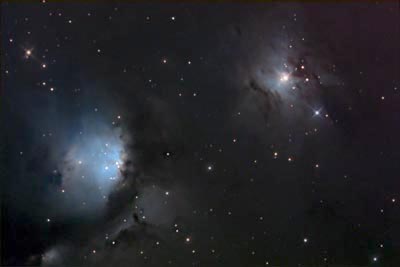Back in the old film days, one would be simply content to record a bluish nebulous haze around the two central stars of M78, and maybe a hint of fuzz around NGC2071. Today, we strive for intricate color variations, tenuous strands of dark nebula, and proto planetary globules. Getting the most contrast and structure out of the superimposed dark nebula was my goals for this image, along with recording the subtle blue shades in the tapering brightness of M78. The two 12th magnitude stars in the core of M78 on the left are know as the "eyes", and while M78 itself has no common name, the elongated wedge shaped nebula underneath, NGC2067 is called the "Handsaw Nebula". NGC2064 is the small blip of nebulosity to its lower left. The other major patch of haze to the upper right is NGC2071, an 8 arcminute sized glow, with a blazing 7.7 magnitude B5 central star. Blues to purples in the colors of this object stand as a background to the brownish to gray foreground dark nebula in this image. For a better composition, I broke my common rule of South up, and oriented the field so north is to the right. Instrument: 12.5" f/5 Home made Newtonian Platform: Astrophysics 1200 QMD CCD Camera: SBIG ST8i Guider: SBIG ST4 Exposure: LRGB = 60:20:20:40 (RGB Binned 2x2) RGB Combine Ratio: 1: .8: 1.2 Filters: RGB Tricolor Location: Payson, Arizona Elevation: 5150 ft. Sky: Seeing FWHM = 3.8 arcsec (Maxim DL - 10min subframe), Transparency 8/10 Outside Temperature: 5 C CCD Temperature: -20 C Processing Tools: Maxim DL, Photoshop, AIP4WIN, PW Pro, RW Debloomer.
|
||||
|
|
||||
|
FastCounter by bCentral |
